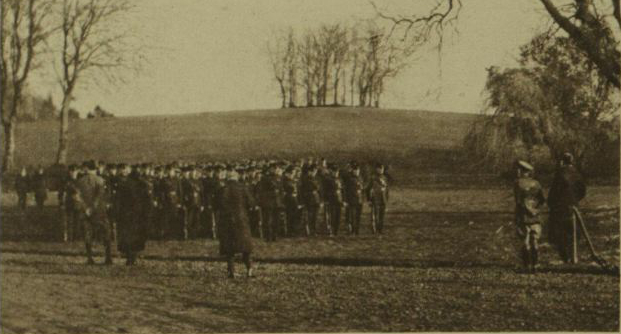Irish border is like Balkans, says Craig
Seskinore, 28 February 1922 – The Prime Minister of Northern Ireland, Sir James Craig, has likened areas along the border with the Irish Free State to the Balkans or Silesia.
In an interview with the political correspondent of the Morning Post on 25 February Craig went on to claim that many loyalists were being targeted by republicans. He alleged that this situation is a consequence of the British government’s decision to agree a deal to establish a boundary commission to determine the future of these districts. ‘In some parts it is unsafe for loyalists to attend to their farms, for they are sniped by rebel troops on the other side of the border line’.
‘Loyalists refugees are already beginning to come in from County Monaghan seeking protection from the gunmen of the Irish Republican Army. All this tyranny, turmoil, and fearful anxiety have been occasioned by two parties entering into an agreement behind the back of the third party, which was chiefly interested. An exhaustive tour of this Ulster boundary should be undertaken by any... who have any doubt as to the result of the government forcing upon these people a commission which shall transfer them from the British flag to that of the Free State or the Republic, whatever it may be.’
Mr Craig, along with his wife Cecil, has just completed a four day tour of the new Ulster frontier during which he visited Newry, Keady, Newtownbutler, Caledon, Aughnacloy, Clogher, Clogher Park, Fivemiletown, Ballygawley, Seskinore and Dungannon. At each stop along the way, he inspected the RIC and Special Constabulary in order to ensure that proper defences were being provided for people on the border.
In Seskinore, Co. Tyrone, on 23 February he inspected B Specials under the command of District Commander Capt. W.H. Fyffe. Afterwards he delivered an address in which he expressed admiration for their splendid turnout. Craig observed that many of the men had served in the old Ulster Volunteer Force (UVF) and also in the Great War. Their present service, he told them, was as important as either of these because their liberties were once again threatened.
Liaison Commission
The Belfast correspondent of the Irish Times has
indicated that efforts are being made to de-escalate tensions
along the border between Northern Ireland and the new Free State
through the mechanism of the newly-established Liaison Commission,
which has been set up to maintain peace and order.
The commission has recommended an exchange of prisoners between north and south to help create better feeling between the two jurisdictions. It has also suggested a system of guarantees to allow Protestant refugees from Monaghan who have fled to Fermanagh and Catholics from the north who have taken refuge in the south to return to their homes.
British Pathé footage showing an IRA patrol on the border with Northern Ireland in 1922
[Editor's note: This is an article from Century Ireland, a fortnightly online newspaper, written from the perspective of a journalist 100 years ago, based on news reports of the time.]





















